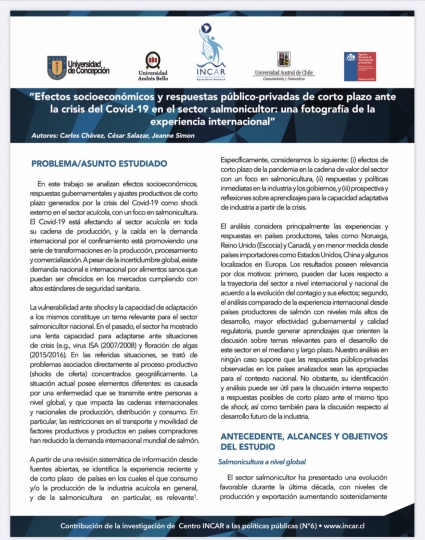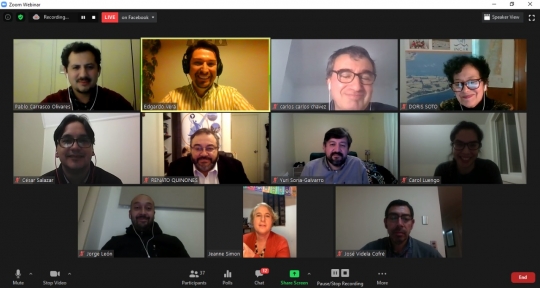On June 11th, in the context of the webinar program La hora acuícola (Aquaculture time), EfD researchers, Carlos Chávez and César Salazar, and coauthor Jeanne Simon, presented a study on the effects of Covid-19 on the aquaculture sector. The presentation was based on the policy brief titled “Socioeconomic effects and public-private responses in the short term to the Covid-19 crisis in the salmon sector: An analysis of the international experience”. This work was funded by the Interdisciplinary Center for Aquaculture Research (INCAR).
Results show that the effects due to pandemics have been reflected in a backward direction on the salmon farming value chain, starting from commercialization and exporting activities with a transmission towards processing, cultivation and fish farming. Furthermore, the study finds the presence of differentiated effects by product exported from Chile to international markets. While frozen Atlantic salmon shows a tendency of diminishing prices even before the Covid-19 outbreak, fresh Atlantic salmon suffers a fall in volume across all importing countries accompanied by a reduction in prices during the pandemic time.
The study was complemented with a systematic revision of open sources, using the Prime-P methodology, over the period January-May 2020. The effects distinguished in the news related to increasing costs in transportation and logistics, cancellation of purchase orders, reduced availability of production inputs, reduced mobility of workers and others related to a reduction in demand and lower profits. Responses from governments and the industrial sector have been similar to the Chilean context, though responses appeared faster in Norway and the United Kingdom. In general, governments respond with more flexibility in environmental regulation. Other aquaculture countries such as China also responded strongly by buying the biomass for national consumption.
Finally, the study concluded that this crisis can be seen as a source of knowledge so we can learn how to improve the adaptation capacity of the Chilean salmon industry, for which, it is necessary to improve the governance structure.
To have access to the policy brief, click here (in Spanish).



